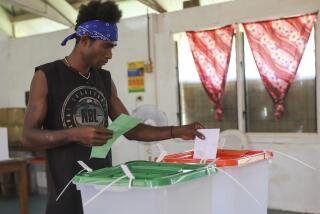Bosnian Vote on Secession Sparks Violence
- Share via
SARAJEVO, Yugoslavia — Armed Serbian vigilantes barricaded key Sarajevo intersections and Muslims took up arms in the city center early today after a contested, two-day referendum appeared to endorse independence for Bosnia-Herzegovina.
Panicked, machine-gun wielding Muslims who sealed off Sarajevo’s main thoroughfare shortly after midnight said three Muslim taxi drivers had been killed by Serbs who had surrounded the city to protest the secession vote.
“This is war!” one nearly hysterical Muslim gunman told journalists, chasing them away from the roadblock at gunpoint.
Serbian rebels sealed off an area around the Bosnian Parliament by hijacking buses and trucks and parking them across the road. They said they were acting in protest of the weekend referendum that served as official endorsement of the republic leadership’s December declaration of independence.
Automatic weapons fire resounded throughout the city, first in celebratory bursts by Muslims and Croats who sought secession from Yugoslavia as a means of avoiding the ethnic conflict that has consumed neighboring Croatia.
But defiant Serbs, who opposed independence from Serbian brothers in other Yugoslav republics, threw up barricades late Sunday night and menaced drivers with machine guns and rifles.
“The referendum was illegitimate. We do not accept leaving Yugoslavia,” declared one bearded rebel with a World War II-era Serbian nationalist emblem pinned to his black beret.
Bombings and shootouts that marred the political run-up to the referendum spread to Sarajevo for the first time Sunday when unknown gunmen, brandishing a Serbian flag, fired on a wedding party in the city’s old Muslim quarter. One man was killed and a Serbian Orthodox priest was wounded, according to witnesses.
One armed Serb at the Parliament barricade said his group of about 50 was stopping cars that tried to pass because they were searching for the perpetrators of the attack on the wedding party.
Muslim claims that three taxi drivers had been killed by Serbs in retaliation could not be verified immediately.
Sarajevo police are predominantly Serbian, and several were seen standing a few hundred yards from the Parliament barricade but making no effort to disperse the vigilantes or to intervene.
Ethnic Serbs, who account for nearly one-third of Bosnia’s 4.4 million population, oppose independence, which would sever them from Serbia, and had warned before the referendum that the vote could spark violence.
The estimated 60% turnout was lower than expected and showed the solidarity of Serbs opposed to secession; Serbian leaders had called for a boycott.
Muslims, the largest of Bosnia’s main ethnic groups with 44%, and Croats, who account for about 18%, had already appealed for independence, claiming that separation from Yugoslavia was now the sole chance to escape being dragged into the dying federation’s savage war.
“It is the will of the citizens that we are an independent and sovereign state now,” said Bosnian Foreign Minister Haris Silajdzic, calling on the United States and European governments to extend diplomatic relations to the newly proclaimed country.
While the referendum needed only a simple majority and 50% turnout to pass, the Serbian community’s protest could foretell further unrest and resistance to wresting Bosnia-Herzegovina from the Serbian-dominated remnants of Yugoslavia.
Tens of thousands of Serbian-commanded federal army troops are deployed throughout the multi-ethnic republic, and they could probably be relied on to back the Bosnian Serbs if the Serbs staged an armed revolt against secession.
Yugoslavia’s warring factions seem fatigued by their 8-month-old fight in Croatia and have voiced support for a planned U.N. peacekeeping operation that gets under way in about one week.
But Bosnia is home to most Yugoslav defense industries, giving the federal army its own reason to resist the republic’s secession. The army’s self-proclaimed commander in chief, acting Yugoslav President Branko Kostic, has vowed he will never order the federal troops to withdraw.
Sarajevo officials confirmed at an election press conference that they will ask for a swift federal army retreat from the republic, once the votes are all counted and secession is declared to have been sufficiently endorsed.
Although Serbia’s Communist leadership has abandoned its earlier insistence on continued Yugoslav unity to keep all Serbs together in one country, hard-line generals directing the armed forces are not yet thought to have given up the fight. Many of them see the preservation of Yugoslavia as a just mission, even if it has to be accomplished by force.
Bosnia would be the fourth of Yugoslavia’s six republics to pull out, joining Slovenia and Croatia, which declared independence in June, and Macedonia, which voted to secede in September.
Official results of the Bosnian vote are expected on Tuesday, but 60% turnout during the tense, two-day referendum ensured validation, and virtually all of the votes cast were thought to support independence.
Yugoslavia’s smallest republic, Montenegro, also held a referendum on independence Sunday. But the 600,000 people of that republic are closely allied with the Serbs, and most planned to vote against secession.
Foreign ministers of the 12-nation European Community meet this week and may decide then to recognize Bosnia and Macedonia. Slovenia and Croatia earned recognition in January, but the EC rejected Bosnia’s bid on the grounds it had not held a referendum to gauge public support. Macedonia, though judged worthy of nationhood, is embroiled in a battle over its name with EC-member Greece, which contends that the former Yugoslav republic could lay claim to the northern Greek area of the same name.
More to Read
Sign up for Essential California
The most important California stories and recommendations in your inbox every morning.
You may occasionally receive promotional content from the Los Angeles Times.














